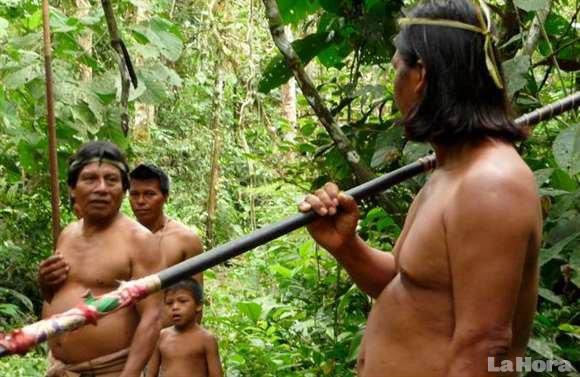


http://deepenglish.com/2016/02/fighting-for-the-amazon/
hire — нанимать, предоставлять работу
hack — рубить, прорубать / If you hack something or hack at it, you cut it with strong, rough strokes using a sharp tool such as an axe or knife.
indigenous — аборигенный, местный, туземный / originating or occurring naturally in a particular place; native
outnumber — превосходить численно
tribe — племя / a group of people of the same race, language, and customs
worst — худший
emerge — появляться; всплывать; выходить / move out of or away from something and become visible
detain — задерживать, арестовывать; брать под стражу / When people such as the police detain someone, they keep them in a place under their control.
drill — бур, бурав, сверлить, добывать
release — освобождать, отпускать / If a person or animal is released from somewhere where they have been locked up or looked after, they are set free or allowed to go.
More than twenty men hired by an oil company hacked through the Ecuadorean jungle. Suddenly, they found themselves surrounded by a large group of indigenous people called the Cofan. The newcomers were clearly outnumbered. In the last five years, several oilmen had been beaten or killed by various tribes inside the jungle.
The oilmen were preparing for the worst, but nothing happened. The tribesmen just stood there silently until a blond, blue-eyed man emerged from their group.
The white man spoke to the oilmen in perfect Spanish, telling them that they weren’t welcome in the jungle. He then told the Cofan people to detain them. They put the oilmen onto their canoes and brought them to their village. Instead of beating them, the white man, whose name was Randy Borman, gave the newcomers a long lecture on how oil drilling was destroying the forest before releasing them.
************************************************************************
deep — глубокий
amongst = among : amongst the guests /среди
settler — поселенец
instead -an alternative or substitute / вместо
depend on — зависеть от чего-то
survive: continue to live or exist, especially in spite of danger or hardship ( пережить, перенести, выжить )
flood -If you say that a flood of people or things arrive somewhere, you are emphasizing that a very large number of them arrive there: поступить в изобилии, хлынуть потоком; нахлынуть.То же самое касается воды: an overflow of a large amount of water beyond its normal limits, especially over what is normally dry land
vanish — disappear suddenly and completely ( исчезать, пропадать)
destroy — слово «строить» = «создавать». А когда появляется приставка «des»( destabilisation, desinformation, destructive и т. д., значит, всё получается с точность до наоборот: destroy = разрушать
to get smb’s foot in the door — быть вхожим
government — правительство
single-handed — done without help from anyone else ( выполненный, сделанный одним, без посторонней помощи)
save — спасать; все, особенно любители приключенческих романов, знают сигнал SOS = save our souls (спасите наши души)
assume — принимать, брать на себя (ответственность, управление)
thrive: If someone or something thrives, they do well and are successful, healthy, or strong ( благоденствовать, преуспевать, процветать)
six times — в шесть раз больше
urgent — взрослые знают или, по крайней мере, слышали словосочетание «ургентный врач»: «В медицине термин ургентный используется для обозначения экстренности, срочности. Латинское слово urgentis означает срочный, неотложный. Ургентный звонок — срочный, на который надо немедленно реагировать.» (otvet.exper). Ну, а если нужен всё-таки перевод, то вот он: срочный, неотложный, безотлагательный.
uncertin — неопределённый; неясный, нестабильный
As the son of American missionaries, Randy grew up deep in the jungle amongst the Cofan people. When his parents decided to leave the jungle, Randy went off to high school in the city, but later returned to the jungle. He couldn’t believe what he saw. Where 500 Cofan people once lived, 30,000 settlers had moved in, all working for the oil industry. Randy decided then that he would reject modern-society and instead spend his life fighting for the protection of the forest.
Tribes in the Amazon depend on the jungle to survive. When oil is discovered, roads are built and thousands of workers flood in. Animals that once lived in these places begin to vanish as they move deeper into the forest, and the plants and trees are destroyed.
Randy happened to be exactly what the Cofan needed. He spoke English, Spanish and Cofan, which helped him to get his foot in the door with governmental agencies. Randy straddledboth worlds. He married a Cofan woman, had three sons with her and felt in his heart that he was a member of the tribe. At the same time, he took trips into cities to fight for their rights.
Randy, now in his fifties, is credited by his tribespeople with single-handedly saving the Cofan people. In the 80s, many assumed the Cofan would die out. Now they are not only surviving, but thriving. They control six times the land they did in the nineties, but the future is always uncertain. Randy’s mission to protect the people of the forest becomes more urgent every day.
************************************************************************
А теперь — вслух, соблюдая паузы и правильное дыхание, и с выражением. Конечно, читать нужно несколько раз. Представьте себя диктором, рассказчиком, учёным и постарайтесь смысловыми акцентами облегчить слушателю понимание смысла.
More than twenty men / hired by an oil company / hacked through the Ecuadorean jungle. / Suddenly, they found themselves / surrounded by a large group of indigenous people / called the Cofan. / The newcomers were clearly outnumbered. / In the last five years, / several oilmen / had been beaten or killed / by various tribes inside the jungle.
The oilmen were preparing for the worst, / but nothing happened. / The tribesmen just stood there silently / until a blond, / blue-eyed man / emerged from their group.
The white man spoke to the oilmen in perfect Spanish, / telling them / that they weren’t welcome in the jungle. / He then told the Cofan people / to detain them. / They put the oilmen onto their canoes / and brought them to their village. / Instead of beating them, / the white man, / whose name was Randy Borman, / gave the newcomers a long lecture / on how oil drilling was destroying the forest / before releasing them.
As the son of American missionaries, / Randy grew up deep in the jungle / amongst the Cofan people. / When his parents decided to leave the jungle, / Randy went off to high school in the city, / but later returned to the jungle. / He couldn’t believe what he saw. / Where 500 Cofan people once lived, / 30,000 settlers had moved in, / all working for the oil industry. / Randy decided then / that he would reject modern-society / and instead / spend his life / fighting for the protection of the forest.
Tribes in the Amazon / depend on the jungle to survive. / When oil is discovered, roads are built / and thousands of workers flood in. / Animals / that once lived in these places / begin to vanish / as they move deeper into the forest, / and the plants and trees are destroyed.
Randy happened to be exactly what the Cofan needed. / He spoke English, Spanish and Cofan, / which helped him / to get his foot in the door with governmental agencies. / Randy straddled both worlds. / He married a Cofan woman, / had three sons with her / and felt in his heart / that he was a member of the tribe. / At the same time, / he took trips into cities / to fight for their rights.
Randy, now in his fifties, / is credited by his tribespeople / with single-handedly saving the Cofan people. / In the 80s, / many assumed the Cofan would die out. / Now they are not only surviving, / but thriving. / They control six times the land they did in the nineties, / but the future is always uncertain. / Randy’s mission to protect the people of the forest / becomes more urgent every day.





